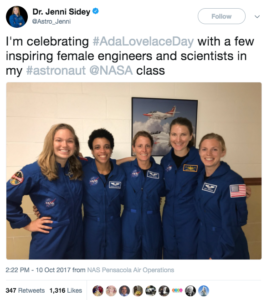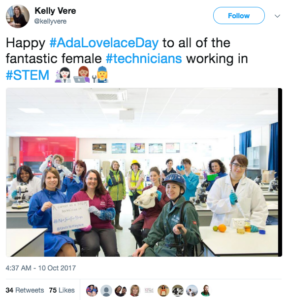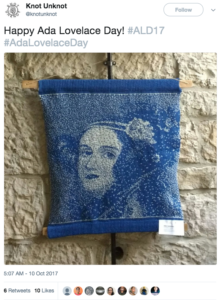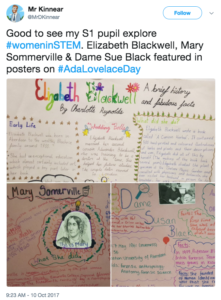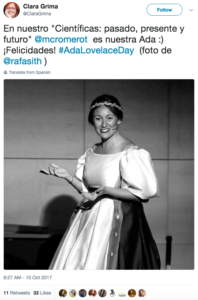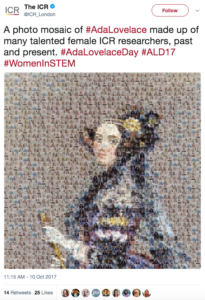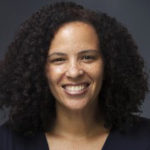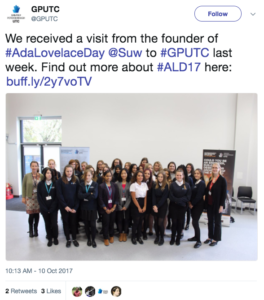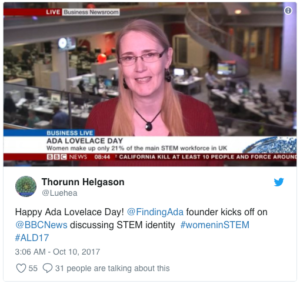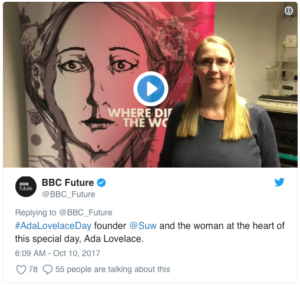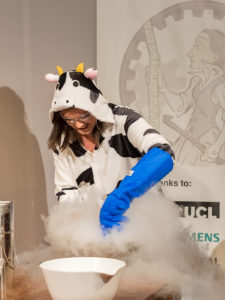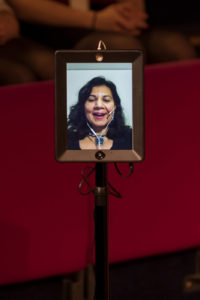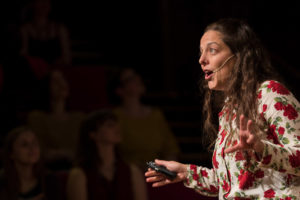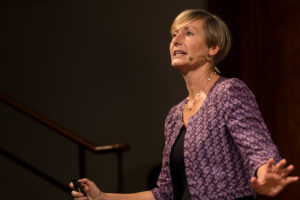Executive summary
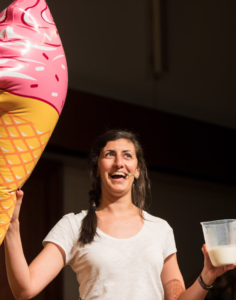
Yasmin Ali
Ada Lovelace Day is an international celebration of the achievements of women in science, technology, engineering and maths (STEM) which aims to inspire girls and women to study and pursue careers in STEM.
Our annual ‘STEM cabaret’, Ada Lovelace Day Live!, was held on Tuesday, 10 October at the Royal Institution, with seven women from across the British STEM community providing entertainment and education to an enthusiastic audience. We also heard from a teen about her studies and her hopes for a career in STEM. All talks are available to watch on YouTube.
Ada Lovelace Day Live! also saw the release of Digital Science’s report, Championing the Success of Women in Science, Technology, Engineering, Maths and Medicine, which examines the issues facing women in STEM and academia.
Once again, people organised independent events around the world to join in the celebration, holding 73 events in 44 different towns and cities across six continents. We extended our global reach this year, with first events held in Iceland, India, Poland and South Africa. And 2017 saw us officially supporting the hugely successful Peterborough STEM Festival 2017, a free, family-focused event held on 1 October.
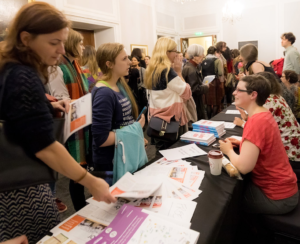 Suw gave several talks around the UK, speaking at OpenTech 2017, Greater Peterborough University Technical College, and at two events at the Centre for Computing History in Cambridge. She also took part in the Take The Lead webinar about women in tech. She was interviewed by Womanthology, Digital Science, and the Pursuit Podcast.
Suw gave several talks around the UK, speaking at OpenTech 2017, Greater Peterborough University Technical College, and at two events at the Centre for Computing History in Cambridge. She also took part in the Take The Lead webinar about women in tech. She was interviewed by Womanthology, Digital Science, and the Pursuit Podcast.
We launched our much anticipated amigurumi crochet dolls, designed to highlight historical women in STEM such as Dr Mae Jemison, Dr Eugenie Clark, and Dr Anandibai Joshi. We also continued to produce our women in STEM podcast, hearing from some fantastic women in STEM about their work, and from male and female guests about the achievements of their favourite women in STEM.
Finally, determined not to let the festive period pass without an appropriately seasonal Twitter and blog campaign, we celebrated The Twelve Days of STEMmas.
Introduction
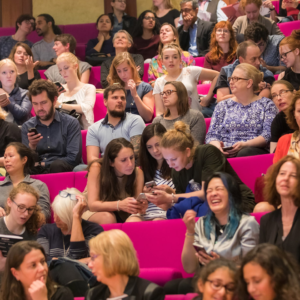 Ada Lovelace Day is a global celebration of the achievements of women in science, technology, engineering and mathematics (STEM). It provides inspiring role models to girls and aims to encourage their interest in STEM, as well as raising the profile of and supporting women currently working in STEM.
Ada Lovelace Day is a global celebration of the achievements of women in science, technology, engineering and mathematics (STEM). It provides inspiring role models to girls and aims to encourage their interest in STEM, as well as raising the profile of and supporting women currently working in STEM.
The first Ada Lovelace Day was held in 2009, organised by Suw Charman-Anderson. It is now held each year on the second Tuesday of October. The day features Ada Lovelace Day Live!, a ‘science cabaret’ which gives women in STEM an opportunity to talk about their work in an informal and entertaining theatre-like setting.
There are also many independent organisers who hold a variety of different events, both on the day itself and throughout October. Every year, dozens of organisers put on a wide variety of events, from pub meets to Wikipedia edit-a-thons to talks and cream teas, in countries across all six inhabited continents from Australia to the USA.
We also work throughout the year to create other materials and services that support girls and women in STEM, as well as teachers, parents, and employers.
This report provides an overview of our activities in 2017, and outlines what we hope to achieve in 2018.
Impact of stereotypes on attitudes to STEM
Research by Accenture early last year confirmed what we already knew: stereotypes still influence young people’s attitudes towards STEM.
This survey of over 8,500 young people, parents and teachers illuminated many of the barriers preventing girls from pursuing STEM subjects. The results confirmed that young people “associate a career in science and technology with ‘doing research’ (52 percent) ‘working in a laboratory’ (47 percent) and ‘wearing a white coat’ (33 percent). The study found that girls are more likely to make these stereotypical associations than boys.”
Additionally, they found belief in stereotypes and biases amongst all groups, with a third of young people thinking STEM subjects matched “male” careers. The study also confirmed that gender stereotyping is sadly alive and well: almost a third (32 percent) of respondents thought “more boys choose STEM subjects than girls because they match ‘male’ careers or jobs”.
The study also revealed that, although younger girls between 7 and 11 years old think that STEM subjects are “fun and enjoyable”, interest drops off between 11 and 14 when girls start to perceive STEM subjects more negatively, describing them as “academic” and “boring”.
This is supported by research from Microsoft, who also found that girls say that they become interested in STEM between ages 11 and 12, but their enjoyment of STEM drops sharply between 15 and 16. The report also found that girls felt “accepted, valued and taken seriously when teachers and boys in their class openly acknowledge their skills in a STEM subject.”
The study identifies five drivers, listed in order of importance, that could help maintain girls’ interest in STEM: Female role models, practical experience and hands-on exercises, teacher encouragement, understanding real-life applications, and confidence in gender equality in the workplace.
Both reports point to the huge amount of work that still needs to be done to increase the number of female role models, improve understanding of careers, and equalise attitudes towards STEM subjects in education and the workplace. Indeed, we’ve noticed that two of our posters — The Amazingly Enormous STEM Careers Poster, which demonstrates the range of careers possible with STEM A Levels and degrees, and the Ten Types of Scientist poster that explores different types of science jobs — remain our most popular two and a half years after they were launched.
Ada Lovelace Day 2017
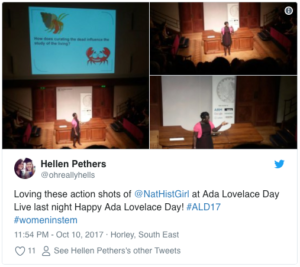 Ada Lovelace Day Live!
Ada Lovelace Day Live!
Our celebrated annual ‘science cabaret’, Ada Lovelace Day Live!, is unique for its focus on women in STEM. The event provides an opportunity for women from across the country to showcase their research and work in a fun and entertaining theatre-like setting. We were delighted to have Helen Arney return as our compère, and particularly enjoyed her leading the audience in a spirited version of The Element Song.
Our speakers were:
- Dr Brenna Hassett, bioarchaeologist and author
- Tricia Sullivan, science fiction author
- Yasmin Ali, chemical engineer
- Aphra Bennett, student
- Prof Beate Kampmann, paediatrician at Imperial College London
- Miranda Lowe, curator, zoology, at the Natural History Museum (right)
- Dr Eugenie Hunsicker, senior lecturer, Mathematical Sciences, Loughborough University
- Dr Praminda Caleb-Solly, associate professor in independent living systems, University of the West of England
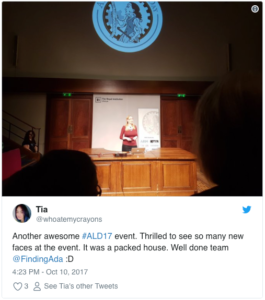 All the talks, including a highlights video, are on our YouTube channel, photos from the event are on Flickr, and we also recorded a special podcast on the day.
All the talks, including a highlights video, are on our YouTube channel, photos from the event are on Flickr, and we also recorded a special podcast on the day.
The evening also featured three book signings by science fiction author Tricia Sullivan, Dr Brenna Hassett who was promoting her new book, Built on Bones, and Helen Arney, who was signing The Element In The Room.
We would like to thank our sponsors for 2017: ARM, UCL Engineering, Siemens Rail Automation, Digital Science, figshare, Present Indicative and Meromorf Press, without whose support we would not be able to run Ada Lovelace Day.
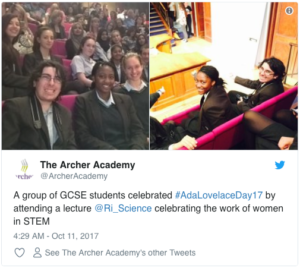
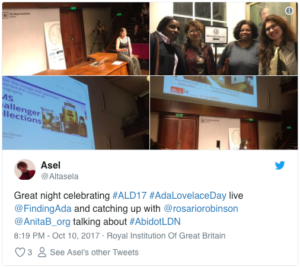
Worldwide events
As ever, we are grateful to the many independent organisers who join in the celebration and hold events, and 2017 saw a variety of creative activities held around the world.
We extended our global reach this year, with first events held in Iceland, India, Poland and South Africa. These events included university staff, students and alumni sharing experiences of STEM; female scientists presenting their work on mathematical modelling for infectious diseases; and an office celebration at Siemens Pure. We continued to see a significant number of events from Europe and the USA, as well as celebrations in Australia, Brazil, New Zealand, and Republic of Korea.
This year also saw us officially supporting the hugely successful Peterborough STEM Festival 2017, held on 1 October. It was a free, family-oriented event, aimed at encouraging engagement from groups less likely to be involved in STEM. It was so successful that tickets for their workshops sold out almost immediately!
Working for our audience and alumnae
While the main aim of Ada Lovelace Day Live! Is to provide an inspiring and entertaining evening for our audience, we also hope to raise the profile of our speakers and promote their work.
We were delighted to have Aphra Bennett, who wrote about her experience in the audience at ALD Live! 2016, speak at the main event about being a young woman studying STEM. It is also wonderful to have a community of women working together, with Aphra being mentored by ALD Live! 2015 alumna Dr Suze Kundu.
Long-term Ada Lovelace Day Live compére Helen Arney appeared on BBC Radio 4’s Great Lives, talking about Hertha Ayrton. (And in case you missed it back in 2013, Suw Charman-Anderson also appeared on Great Lives talking with another ALD Live! alumna, Konnie Huq, about Ada Lovelace.)
Press coverage
Ada Lovelace Day continues to draw healthy attention in the press, with articles on the day itself and other women in STEM appearing in a variety of media outlets. Here are a selection of the dozens of articles that appeared:
- BBC Future: The female code breakers who were left out of the history books
- Scientific American: Ada Lovelace Day Honors “the First Computer Programmer”
- Mashable: Before and after: Women finally get their due in STEM stock photos
- Gizmodo: Ada Lovelace: The World’s First Computer Programmer Was a Victorian Mother of Three
- Science Focus: 10 amazing women in science history you really should know about
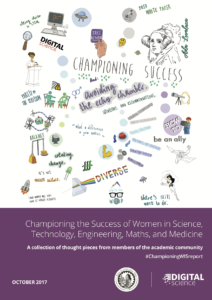
Digital Science champion success
At Ada Lovelace Day Live!, Digital Science launched their report Championing the Success of Women in Science, Technology, Engineering, Maths and Medicine. Opening with a foreword from Suw, the report “explores the role of women in STEM and the challenges they face, looking at areas of gender inequality, exploring potential causes of this inequality and offering solutions”.
It includes chapters on the importance of women being responsible for budgets, the gender split in research funding, and the insights provided by ‘altmetrics’ or “data from the social web that help us understand how research is discussed, shared, reviewed, rated, and reused by other researchers and members of the public”.
The report was covered by The Conversation, Nature, Scientific American and LSE and can be downloaded free from Figshare.
Ada Lovelace Day Podcast
Throughout the year, we continued to produce a monthly podcast episode, talking to a wide variety of guests about their research, work and careers, including chemist Dr Raychelle Burks, patient safety expert Dr Maryanne Mariyaselvam, engineer Dawn Childs, and fire engineer Kristen Salzer-Frost.
We also talked about a wide variety of women in STEM, with theoretical physicist Professor Jim Al-Khalili talking about Daphne Jackson, the first woman to become a professor of physics in the UK; science writer Simon Singh talking about French mathematician Sophie Germain and American astronomer Henrietta Swan Leavitt; author Robin Sloan talking about science fiction writer Anne Leckie; and head of the IET Library and Archives Anne Locker talking about electrical engineer Margaret Partridge.
We had a huge number of fantastic guests throughout the year, and would like to thank ARM for their sponsorship of the podcast through until the end of 2017. There will be one last episode of the podcast released in 2018, after which it will be put on hiatus so that we can focus on other projects.
Women in STEM amigurumi figures
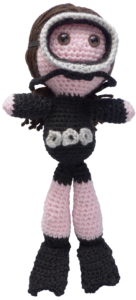 This year saw the release of our women in STEM amigurumi figures. Amigurumi is a popular style of crochet and knitting that originated in Japan and features cute dolls, ranging from animals and humans through to sharks, cupcakes and even blood cells! Amigurumi have become very popular and, since girls absorb the idea that STEM is ‘not for them’ very early in their lives, we thought a craft activity would be a great way of challenging these stereotypes, as well as honouring women in STEM.
This year saw the release of our women in STEM amigurumi figures. Amigurumi is a popular style of crochet and knitting that originated in Japan and features cute dolls, ranging from animals and humans through to sharks, cupcakes and even blood cells! Amigurumi have become very popular and, since girls absorb the idea that STEM is ‘not for them’ very early in their lives, we thought a craft activity would be a great way of challenging these stereotypes, as well as honouring women in STEM.
Our first pattern, Dr Mae Jemison, was released in February, and tested by the community at Ravelry, where we maintain a profile. This was followed by patterns for Dr Eugenie Clark (right) and Dr Anandibai Joshi. We have so far had nearly 1,000 downloads of the patterns, which are available in both UK and US terminology. We hope to develop more patterns through 2018.
Talks, events and presentations
OpenTech 2017
On 13 May, Suw spoke at OpenTech 2017 in London, giving a brief history of Ada Lovelace Day, talking about our plans for the year, and announcing our first online careers fair for women in STEM. You can listen to the audio from the talk on the OpenTech 2017 website, with Suw’s segment starting at about 24:37.
Take The Lead webinar
On 12 July, Suw took part in a webinar from Take The Lead called Women in Tech: Building Support for Women in STEM. Suw joined Adda Birnir, founder & CEO of Skillcrush, and Heather Cabot, co-author & co-founder of Geek Girl Rising, in a discussion facilitated by Take The Lead founder Gloria Feldt.
Greater Peterborough UTC
Ada Lovelace Day was celebrated this year by the Baker Dearing Educational Trust, who arranged for Suw to speak to a group of girls at the Greater Peterborough University Technical College. Suw gave a talk to a very attentive and engaged group, and was then given a tour of the Greater Peterborough UTC’s facilities.
The Baker Dearing Educational Trust also arranged interviews about Ada Lovelace Day for Suw, on TV with BBC World News, and on the radio with the British Forces Broadcasting Service and Source FM/Pirate FM in Cornwall.
Centre for Computing History
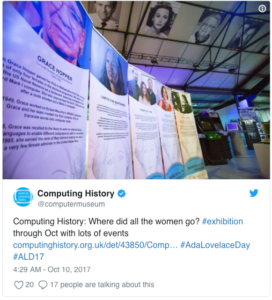 October saw the Centre for Computing History in Cambridge host an exhibition about women in tech, Computing History: Where Did All the Women Go?,with a slate of events including talks, workshops and performances.
October saw the Centre for Computing History in Cambridge host an exhibition about women in tech, Computing History: Where Did All the Women Go?,with a slate of events including talks, workshops and performances.
The exhibition was launched with a panel discussion on 5 October, Want to succeed in tech? Try not to be a woman…. Chaired by Suw, the debate featured Professor John Naughton, businesswomen Claire Hopkins and Dr Valerie Lynch, and Dr Amanda Prorok, lecturer at the Computer Laboratory, University of Cambridge. You can watch the debate on YouTube, and read Claire Hopkins’ view of the evening on her blog.
The next evening, Suw gave a presentation about Ada Lovelace, women in STEM, and why she set up Ada Lovelace Day, which you can also watch on YouTube.
Interviews
Womanthology interviewed Suw about the gender balance in the current UK political system. She discussed how our political structure is closely intertwined with class, and that it’s very difficult for women and minorities to get involved. She compared the system in the UK to the US, where there has been a significant increase in political activity, particularly to encourage women to run for office, and hopes that initiatives started in the UK can be as successful.
Digital Science interviewed Suw for their #FoundersFriday series of blog posts. They asked about her life before Ada Lovelace Day, what she was most proud of as the founder of a business, and where she saw Ada Lovelace Day in five years time. They also covered questions about the issues faced by women in STEM, and and asked for her top tips for developing a business idea.
BBC Future asked Suw to record a short video about Ada Lovelace for their Twitter campaign celebrating the day, which she did whilst at the Centre for Computing History in Cambridge.
Suw wrote a guest blog for the Campaign for Science and Engineering (CaSE) to outline how 2018’s upcoming careers fair for women in STEM would help tackle the STEM skills shortage. She discusses the importance of diversity to businesses, for both ethical and financial reasons.
Finally, Suw featured on the Pursuit Podcast talking about how to turn your passion project into a business, including experimenting with different projects and testing revenue streams. She also talked about her work at Ada Lovelace Day.
Community
This year, in conjunction with the Arthur C Clarke Award, we created a new space for women on Facebook, The Plotters’ Club. The aim is for women writers and women working in STEM to have a place to exchange ideas and techniques, to improve both the accuracy of science fiction and make writing more engaging. The community was featured in Women Writers School.
We continue to maintain spaces on a number of social networking sites, and are delighted to have almost doubled our Twitter following this year from 8,046 to 13,763, with 39 percent of those followers based in the UK and 34 percent in the US. Our monthly newsletter has 1,246 subscribers, and a 23 percent open rate, with 32 percent of subscribers in the UK and 40 percent in the US. Our website got an average of 12,000 page views per month with 30 percent of visits lasting longer than 30 seconds, and 39 percent of visitors coming from the UK and 28 percent from the US.
Our Facebook page has 806 likes and 834 followers, and our Facebook group has 571 members, although Facebook’s algorithm changes has made it much harder to reach people on that platform. We also have a nascent presence on both Instagram and Pinterest, although both accounts need more resources than we can currently bring to bear on them.
STEMmas Festive Celebration
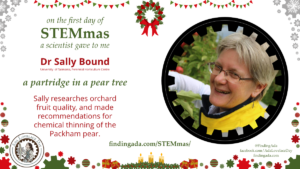 Over Christmas, we ran the Twelve Days of STEMmas, a festive campaign highlighting the work of women in STEM. We found women working in areas that relate to the items described in the song, and then wrote blog posts for each one, with a festive graphic that we also shared on Twitter.
Over Christmas, we ran the Twelve Days of STEMmas, a festive campaign highlighting the work of women in STEM. We found women working in areas that relate to the items described in the song, and then wrote blog posts for each one, with a festive graphic that we also shared on Twitter.
The project was very well received, and provided us with an opportunity to speak out about the difficulty of finding information about women scientists, particularly of women of colour, as they frequently do not have the public profiles and thus don’t come up in search engine results. We hope to involve our community in suggesting more women to include for Christmas 2018.
Projects for 2018
Ada Lovelace Day Live 2018
Work started on the very first ALD in late 2008, with the first Day held on 24 March 2009. We will be celebrating the tenth Ada Lovelace Day in style with our Live! event on Tuesday, 9 October 2018 at the Institution of Engineering and Technology (IET), hosted by the IET Women’s Network.
Encouraging events worldwide
Because this is our tenth year, we will be working to reach out to independent event organisers and encouraging them to hold a special event in celebration of Ada Lovelace Day. We hope to see a record number of events around the globe!
Careers fair
Next year will see the launch of our very first FindingAda Online Recruitment Fair for Women in STEM. It will be a unique opportunity for employers and candidates to talk about job opportunities via a flexible online platform, provided by GoIntro.
Role models report
In 2016, we began work on a report on a literature review to explore the current evidence base. Work is ongoing, and we continue to seek a sponsor to support it.
Expanding our Advisory Council
The Finding Ada Advisory Council supports Ada Lovelace Day with both strategic and practical advice on governance, fundraising, marketing and community growth. Due to work commitments, Tom Hunter, director of the Arthur C Clarke Award, had to retire from the council, so in 2018 we will be looking to expand our list of advisors.
Challenges for 2018
Our challenges remain very similar to last year’s, but with the addition of a tranche of regulatory work that we need to do:
Community and promotion
We continue to grow our presence on social media, particularly on Twitter. However, changes to Facebook’s timeline algorithm have reduced organic reach, so in 2018 we will run a publicity campaign to increase subscriptions to our newsletter.
Funding
Brexit has had an impact throughout the sector on sponsorship, and whilst sponsors remain critical to our success, 2018 will see further experimentation with new revenue streams.
GDPR
The General Data Protection Regulation (GDPR) comes into force in May 2018, and we will spend significant time to ensure that we are compliant with the new legislation.
Thanks to our partners, sponsors, supporters and volunteers
Ada Lovelace Day could not provide the support and opportunities it does without the support of our generous sponsors and partners. We would like to thank ARM, UCL Engineering, Google, Siemens Rail Automation, Digital Science, figshare, Present Indicative, and Meromorf Press.
If you would like to join this list and become one of our supporters in 2018, then please take a look at the sponsorship prospectus online.
We are also very grateful to our Patreon supporters who, at the end of 2017, were donating a total of $197/£139 per month. We value every penny and hope you will consider becoming a Patreon supporter in 2018.
Last, but definitely not least, our thanks are due to all our volunteers, helpers, speakers and independent event organisers, whose hard work and dedication has made Ada Lovelace Day into a truly worldwide phenomenon that is now an integral part of many people’s calendars. Thanks also to our freelance admin staff and volunteers who have enabled us to expand our work and to help girls and women in STEM all year round.
All Ada Lovelace Day Live photos by Paul Clarke
